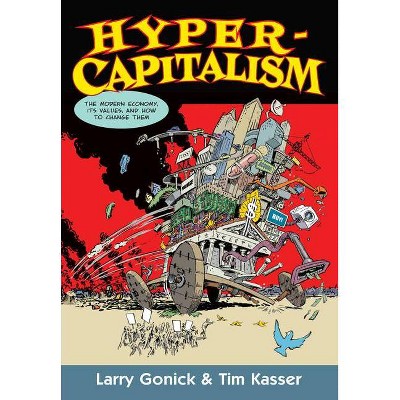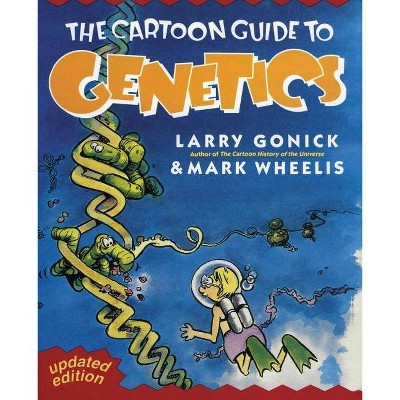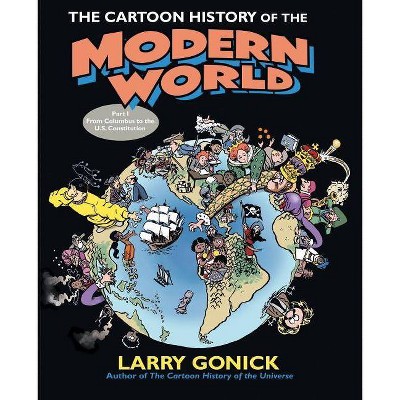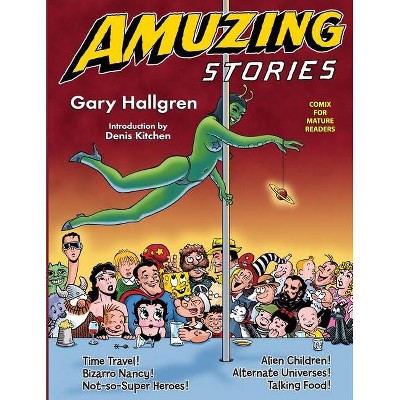Hypercapitalism - by Larry Gonick & Tim Kasser (Paperback)

Similar Products
Products of same category from the store
AllProduct info
<p/><br></br><p><b> About the Book </b></p></br></br>"From the bestselling cartoonist of The Cartoon History of the Universe comes an explosive graphic takedown of capitalism. Bestselling "overeducated cartoonist" Larry Gonick has delighted readers for years with sharp, digestible, and hilarious accounts of everything from the history of the universe to the story of calculus. Now Gonick teams up with psychologist and scholar Tim Kasser, an expert on how happiness and values relate to our materialist society, to create an incomparable cartoon guide to what, exactly, is wrong with modern life, why we're all so miserable-and what can be done about it. Hypercapitalism is an accessible and pointed cartoon guide to the threats to humans, our society, and the environment posed by the current form of global capitalism. A primer for the post-Occupy generation, Hypercapitalism also provides a concise introduction to the thinkers (Stiglitz, Piketty, Sandel, Schor, et al.), movements (voluntary simplicity, the sharing economy, intentional communities, the time-affluence movement), and concepts (hypercapitalism, corporate power, GNP alternatives), that are critical to understanding and changing the world we live in. In pointed, profound, and entertaining cartoon narratives, the authors take readers inside the inner workings of the global economy, rendering even the most complex ideas in clear, plain--and sometimes hilarious--terms"--<p/><br></br><p><b> Book Synopsis </b></p></br></br><b>PAPERBACK ORIGINAL From the bestselling cartoonist of <i>The Cartoon History of the Universe</i> comes an explosive graphic takedown of capitalism</b> <p/>Bestselling "overeducated cartoonist" Larry Gonick has delighted readers for years with sharp, digestible, and funny accounts of everything from the history of the universe to the intricacies of calculus. Now Gonick teams up with psychologist and scholar Tim Kasser to create an accessible and pointed cartoon guide to how global, privatizing, market-worshiping hypercapitalism threatens human well-being, social justice, and the planet. But Gonick and Kasser don't stop at an analysis of how the economic system got out of whack--they also point the way to a healthier future. <p/>A primer for the post-Occupy generation, <em>Hypercapitalism</em> draws from contemporary research on values, well-being, and consumerism to describe concepts (corporate power, free trade, privatization, deregulation) that are critical for understanding the world we live in, and movements (voluntary simplicity, sharing, alternatives to GDP, protests) that have developed in response to the system. Gonick and Kasser's pointed and profound cartoon narratives provide a deep exploration of the global economy and the movements seeking to change it, all rendered in clear, graphic--and sometimes hilarious--terms.<br><p/><br></br><p><b> Review Quotes </b></p></br></br><br><b>Praise for <i>Hypercapitalism</i>: </b><br>"Accompanied with breezily quirky cartooning that cleverly fuses art and hard information, Gonick's latest is another triumph: a new self-education classic for these troubled times."<br>--<b><i>Publishers Weekly</i></b> <p/>"A timely counter to those who celebrate predatory economics as the best of all possible financial worlds."<br>--<b><i>Kirkus Reviews</i></b> <p/>"A great introduction to the current state of the economy and what can be done about it, and a solid addition for Gonick's many fans."<br>--<b><i>Library Journal </i></b> <p/>"This book explains much about how the world works, and why it increasingly doesn't. Read it soon, before we lose any more ice caps."<br>--<strong>Bill McKibben, author of <em>The End of Nature</em> and <em>Deep Economy</em></strong> <p/> "Like fish who don't know they live in polluted water (because it's everywhere), many people don't know they live in economically, socially, and politically polluted societies. <em>Hypercapitalism</em>, in lucid prose and delightful graphics, pulls back the curtain with crystal clarity. I can't think of a better book for young people to read as they chart their futures."<br>--<strong>Barry Schwartz, author of <em>The Costs of Living</em>, <em>The Paradox of Choice</em>, and <em>Why We Work</em></strong> <p/> "A clear and concise description of how the market economy functions, why it encourages the worst aspects of human nature, and how we can cope in an age of excess."<br>--<strong>John Gowdy, Professor of Economics and Professor of Science and Technology Studies, Rensselaer Polytechnic Institute</strong> <p/> "A truly unique, page-turning graphical account . . . Gonick and Kasser pull off the monumental feat of rendering an otherwise dry and complex social-economic topic as clear, entertaining, informative, and even hilarious in spots. <em>Hypercapitalism</em> is a remarkable, essential and hopeful book for our times. To embrace and act upon its message is to live better."<br>--<strong>Nomi Prins, author of <em>All the Presidents' Bankers</em> and <em>It Takes a Pillage</em></strong> <p/><b>Praise for Larry Gonick's <i>The Cartoon History of the Universe</i>: </b><br>"A curious hybrid, at once flippant and scholarly, witty and politically correct, zany and traditionalist."<br>--<b>Jonathan Spence, <i>The New York Times Book Review</i></b> <p/><b>Praise for Larry Gonick's <i>The Cartoon History of the United States</i>: </b><br>"A perfect gift for that teenager who simply can't get American history straight."<br>--<b><i>San Francisco Chronicle</i></b> <p/><b>Praise for Larry Gonick's <i>The Cartoon Guide to Sex</i>: </b><br>"The humor is both fundamental and sophisticated, so even the most sexually seasoned will find something to laugh about."<br>--<b><i>Publishers Weekly</i></b> <p/><b>Praise for Larry Gonick: </b><br>"Larry Gonick should get an Oscar for humor and a Pulitzer for history."<br>--<b>Richard Saul Wurman, author and creator of the TED conference</b><br><br><p/><br></br><p><b> About the Author </b></p></br></br><b>Larry Gonick</b>, a cartoonist specializing in nonfiction books, is best known for his Cartoon Histories and his Cartoon Guides to various sciences. He lives in San Francisco. <b>Tim Kasser</b>, a professor of psychology at Knox College in Galesburg, Illinois, has spent two decades researching materialism, consumerism, capitalism, well-being, and the environment. He has written three books and consults with a variety of non-profit organizations.
Price History
Price Archive shows prices from various stores, lets you see history and find the cheapest. There is no actual sale on the website. For all support, inquiry and suggestion messagescommunication@pricearchive.us




















